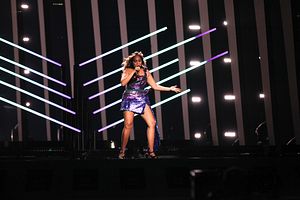From November 30 to December 7 this year, Australia will host the inaugural Eurovision Asia Song Contest on the Gold Coast. Discussions have also been ongoing for Australia to take part in the Asian Games, the largest multisport event in the region. These developments, while seemingly trivial, are arguably part of Australia’s soft power strategy in Asia. Canberra seeks to shift perceptions of its place in Asia from being merely adjacent to the region toward being an active member of it.
As an Australian, I have spent the last two years living in Indonesia. When asked where I’m from, I often receive the friendly response, “Ah, we’re neighbors.” These exchanges demonstrate an acknowledgment on the part of many ordinary Indonesians of the closeness, at least geographically, between our two countries. However, while Australia may be considered a neighbor, its history has meant that it has not been considered part of the neighborhood, that is, part of Southeast Asia or Asia more broadly.
Former Malaysian Prime Minister Abdullah Badawi once commented that Australia would remain a second-class participant in Asia’s vision, with ASEAN+3 (the Southeast Asia nations plus China, Japan, and South Korea) to be the driver of integration. However, in recent times there has been something of a shift in this dynamic. For instance, the first ASEAN-Australia Biennial Summit was held in Vientiane, Laos, in 2016, paving the way for the ASEAN-Australia Special Summit in March 2018 and the Sydney Declaration. In a joint statement, the partners stated that the summit “marks a new era in the increasing close relationship” and that “we are partners with a vital stake in a dynamic region undergoing major changes.”
However, while this shows some progress at the level of government-to-government cooperation, it does not necessarily change how Australia is perceived by the people of the region. This is where soft power comes in.
Soft power is one of Australia’s greatest strengths in international affairs. The government’s 2017 White Paper committed to reviewing the country’s soft power strengths and capabilities, with a focus on how Australia could maximize its soft power approach in the Indo-Pacific region.
For this reason, it is significant that the Sydney Declaration contained a section titled “Our People” that states, “ASEAN and Australia share long-standing, deep and dynamic social and cultural connections.” In the same section, the partners expressed a commitment to strengthening people-to-people linkages, with a particular focus on education, highlighting initiatives such as the New Colombo Plan, Australia Awards, Endeavor Scholarships and Fellowships, and programs run by the Australia-ASEAN Council.
Beyond these initiatives, Australia appears to also be using popular culture as a strategy to change perceptions of Australia within the region.
For instance, the inaugural Eurovision Asia Song Contest will be held on the Gold Coast later this year, featuring singers from across the region. Australia has competed in Eurovision since 2015, when it was invited as an honorary participant, and has been invited back every year since. However, by spearheading an Asian competition, and playing the inaugural host, Australia is arguably broadcasting its belief it is part of the region and attempting to encourage audiences across the region to associate Australia with Asia. Furthermore, Australia’s representation at Eurovision has showcased the diversity that makes up contemporary Australia, and so an Asian competition gives Australia the opportunity to alter perceptions in Asia that Australia is a monoculture still tied to its colonial roots.
Another major competition, one that has been held since 1951, but in which Australia is yet to take part, is the Asian Games, the largest multisport event in the region. Australia’s proposal to participate in the Asian Games in 2007 was rejected. However, after Australian athletes were invited to compete at the 2017 Asian Winter Games as “guests,” discussions were reopened about future participation in the Asian Games. The Olympic Council of Asia has since announced that a small contingent of athletes from Oceania countries will be allowed to compete at the 2022 Hangzhou Games, so long as their qualification path for the 2024 Paris Olympic Games is through Asia. This may be a sign of things to come. Australia is already a member of the Asian Football Confederation, having joined in 2006, and hosted and won the 2015 AFC Cup. It has also been a member of the ASEAN Football Federation since 2013.
The success of Australia’s efforts to engage with Asia in the Asian Century may hinge on how Australia, long viewed as an outsider, is considered to fit within the region. Australia’s participation in regional events, such as Eurovision Asia and high-level sport tournaments like the Asian Games, appears to be part of a soft power strategy that focuses not simply on promoting Australia, but on shifting the perceptions of publics within Asia to see Australia as part of the region.
Shane Preuss is a graduate of the University of Melbourne’s Master of International Relations program. He currently works for a news media company in Jakarta, Indonesia.

































